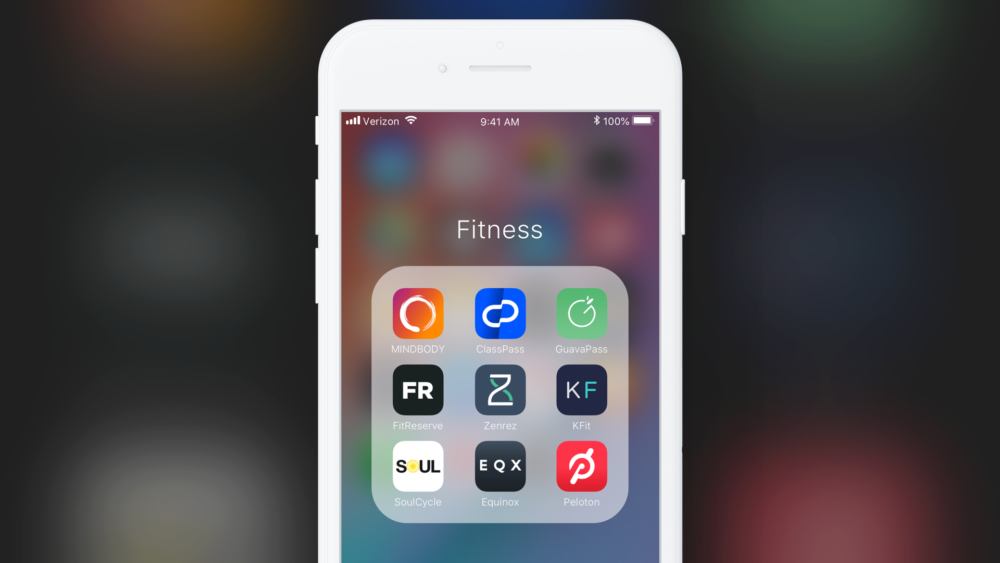Over the last decade, the fitness landscape has seen boutique studios steal the spotlight from big box gyms. According to IHRSA’s Guide to the Boutique Studio Phenomenon, studios now account for 42% of the club market — double what it was in 2014.
The boutique boom has given rise to a number of new business models. From Groupon “deals” to dynamic pricing and various iterations on the multi-studio membership, startups and established players are trying to carve out their niche or extend their value chain.
Putting the specifics aside, there are two sides of this equation — exercise-seekers and studio owners. The former loves variety, flexibility, and saving money. The latter benefits from marketing, lead generation, and selling excess inventory (empty spots in class). Providing value on both sides of this equation is the holy grail for companies in the space.
But when we zoom out, we see that many of these models are still on shaky ground. Despite hundreds of millions in funding, fitness subscription frontrunner ClassPass is still tweaking their model — changing pricing and launching new service lines in pursuit of sustainability (and eventually profitability?). The recent wave of at-home exercise products hoping to become the Peloton of “X” has further complicated the matter. The same is true as Aaptiv-like voice workouts and streaming services scale up.
Given these developments, the question remains: can discounts, dynamic pricing, and multi-studio memberships fulfill the dreams of fitness-seekers, studio owners, entrepreneurs, and investors? Or will discounting fitness, no matter the method, lead to a Groupon-like—or worse, MoviePass-like—future?
The Players
The consumer. From devoted health nuts to casual exercisers, people are spending big bucks to get and stay fit. Driven in part by younger generations who view exercise and eating well as an essential part of their lifestyle, the business of fitness is on the upswing. As a result, a growing number of consumers are searching for the sweat session that’s right for them.
Whether it’s cost, convenience (proximity to work or home), class-type, or cool factor (think studios like SoulCycle and Barry’s Bootcamp who win on brand), consumers consider a number of factors when choosing a workout. So, the need for a fitness search engine or aggregator makes total sense. The ability to discover and book classes in one place is a huge bonus. And, of course, an affordable multi-studio membership or discount is a dream scenario.
The studio. Opposite the consumer, business owners need butts in the seats — or sweaty bodies in the studio. From their perspective, customer acquisition is the name of the game. Whether it’s Groupon, Yelp, Google, or social advertising, anything goes if it means attendance and revenues are going up. So, when ClassPass—and similar services—hit the scene around 2013 promising to be a marketing channel and new revenue stream for studios, joining was a no-brainer.
ClassPass. Having pioneered the multi-studio membership while raising $255M along the way to launching in cities around the world, ClassPass is the leader in the fitness subscription space. However, the company isn’t without their list of woes. From ditching the unlimited option to hiking prices and alienating studio owners, the startup is far from perfect. Still, having been first to market, they’re trailblazers in the space. And, with backing from A-list investors, they’re seemingly too big to fail.
MINDBODY. Here’s where things really start to get interesting. From the consumer’s perspective, MINDBODY might not be on the radar. But in reality, MINDBODY is the biggest player in the boutique fitness game. They are the operating system for gyms and studios everywhere, providing the software for booking classes, managing staff, and a point-of-sale system. For context, the company was acquired (and taken private) by Vista Equity Partners in December of 2018 for $1.9B.
Behind the Scenes
Think of it this way: historically, MINDBODY has been a B2B software that helps fitness businesses (and with their acquisition of Booker, spas and salons, too) function. On the other hand, ClassPass is a consumer-facing product that benefits business owners on the back-end. But a number of recent developments point toward a shakeup in the space.
First, it’s important to know that ClassPass is deeply integrated with MINDBODY. In many instances, the information you see in the ClassPass app—the studio’s schedule, instructor, and open spots—is being generated by MINDBODY. And when you sign up for class, you aren’t signing up with the studio, you’re signing up with MINDBODY, who then registers you with the studio.
No, MINDBODY isn’t doing ClassPass a favor — ClassPass pays for this service. On their website, MINDBODY lists the API integration as $10 per MINDBODY-partnered studio plus $1 per transaction (depending on utilization). While MINDBODY is making millions from ClassPass and other API partners, there’s a much bigger opportunity at stake — the ability to control supply and demand.
As a B2B platform, MINDBODY represents the supply side or inventory of classes. ClassPass, on the other hand, is a demand funnel. MINDBODY users download and sign into the app to book a class because the studio they’re sweating at runs on MINDBODY. A ClassPass user downloads the app and subscribes because they’re searching for something — that’s demand.
But with the 2017 acquisition of Lymber, MINDBODY is officially in the demand game. According to Lymber’s former CEO Doug Hecht, the company is the “Expedia for fitness and wellness studios”, using dynamic pricing to help studios sell unused class and appointment inventory. And in May of this year, MINDBODY announced a new version of their app that makes it “easier for people to explore and book a wide variety of classes… at the time, place and price that best fit their lifestyle”.
Translation: MINDBODY is using their purchase of Lymber, within a new app, to bolster their brand among consumers. A partnership with Google is also helping make them a stronger player on the demand side of things. The punchline here: could MINDBODY’s consumer brand become more valuable than their partnership with ClassPass? And if it does, could MINDBODY turn off ClassPass’s access to their API?
Competition
While MINDBODY and ClassPass might be behemoths, they’re certainly not alone. As ClassPass founder Payal Kadakia told Fast Company, there are a lot of “copycats” trying to lay claim to the subscription-fitness idea. Kadakia and ClassPass see it as their “product to protect”. And they’re not wrong in thinking this way — there are plenty of competitors attempting to cash in on similar iterations of their products.
For one, ClassPass acquired Fitmob in 2015. In the opinion of a former Fitmob employee, Fitmob was out-executing ClassPass and ClassPass’s only option was to acquire them. Instead of combining the two products and their respective features, ClassPass forced Fitmob users to abandon the Fitmob platform in favor of their own.
With Fitmob out of the way, FitReserve is probably the closest ClassPass competitor in the US. That said, FitReserve is only available in three cities — New York, Boston, and Washington, DC. Like ClassPass, FitReserve is a multi-studio membership. But, according to co-founder Meghan Smyth, they’ve differentiated themselves by offering “the studios’ full class schedules, including all peak class times”. So far, that value proposition hasn’t been enough to keep pace with ClassPass — hundreds of millions in funding does have its perks.
In the US, Zenrez is also making waves in the bookings space by using dynamic pricing to help studios sell unused spots in class at a discount. Their unique selling proposition is that they’re studio-centric — studios fill spots without having to reserve inventory for subscription members. On the consumer side, there’s no membership fee and users get a discount on their booking.
Despite having differentiated their model, Zenrez has hit a few snags. Like ClassPass, Zenrez also runs on frenemy MINDBODY’s API. Coincidentally (or not so coincidentally), just as Zenrez closed a $6M Series A, MINDBODY announced their acquisition of Lymber and their inventory management/dynamic pricing tech that’s very similar to that of Zenrez. And ClassPass is already offering dynamic pricing. All this puts Zenrez is a difficult spot when it comes to a possible exit strategy and raising additional funding.
Then there’s also the concern that— as one Zenrez studio partner put it—across the board, dynamic pricing rewards customers for signing up at the last minute. If that’s true, the fear is that people will become reliant on Zenrez-like services, which could result in a model where the repeat drop-in customer makes up the bulk of class-goers and full-fledged members are few and far between. And this would present a major problem for studio owners as loyal clientele are their bread and butter.
And the list goes on
From GymPass to StudioHop and Dibs, the list of US-based competitors is growing. There’s also an ever-expanding number of discounted, dynamic pricing, and/or subscription-based models available internationally.
Most notably is GuavaPass, a formidable foe for ClassPass now that they are launching in Asia. Using a subscription-based model, GuavaPass has more than 2,500 studio partners in 12 cities including Singapore, Hong Kong, Beijing, Jakarta, and Dubai. Although they have a head start, ClassPass has a bigger bank account — GuavaPass has raised $5M to date. With the recent news of ClassPass arriving in Asia, expect GuavaPass to announce a funding round here soon.
UPDATE: In January of 2019, ClassPass acquired GuavaPass. In early 2020, ClassPass acquired MuvPass, one of Chile’s top fitness platforms, and Clickypass, a leading fitness network in Argentina.
Then, offering a glimpse into a future where ClassPass fails to land on a sustainable model, there’s Kfit. After raising $15M from the likes of Sequoia Capital to expand its studio-subscription service, the company scaled back its fitness platform and pivoted to an e-commerce deals model that included the purchase of Groupon’s businesses in Southeast Asia.
This is especially interesting considering there have been rumors that ClassPass could launch a Groupon-like service line called LifePass — giving users access to non-fitness activities like cooking classes, concerts, and volunteering opportunities.
Of course, a move like that would be motivated by the double-edged sword that is venture capital at the scale ClassPass has raised — at some point, there has to be a liquidity event (read: profitability, exit, IPO, etc.). To date, that looming pressure has seen ClassPass launch Live (streaming workouts), Go (voice-led workouts), and Getaways (wellness retreats), as well as beauty and wellness services like blowouts, facials, and massages.
Sure, these offerings can help grow the brand, user-base, and revenue, but they run the risk of disrupting their core product: studio partners who could see the new services as competition.
If you build it…
So what’s the end-game here? Your guess is as good as mine. But here are a few things that we do know.
For one thing, the health and fitness space is still relatively young. That’s especially true when you think of the tech-enabled side of the business. From streaming to voice and at-home products hoping to become the Peloton of “X”, we’re just beginning to scratch the surface of how people will break a sweat in the future — or how big the industry will become.
That fact complicates matters for the likes of ClassPass and other discount or dynamic pricing companies who are evolving in parallel with the industry — the ground is shifting beneath their feet. And trying to keep up with or get ahead of what can be a cash-burning machine.
When it comes to winners and losers, though, the real winner is the fitness-seeker. In months and years to come, there will be innovation, consolidation, and more than a few headstones added to the startup graveyard. But if any of these companies deliver on their value proposition, studios will bring in more revenue while consumers pay less for more options on where and how they get moving. And that last part is something the entire industry should be able to get behind.
Want to get in touch? Email anthony@fitt.co with tips, questions, or to continue the conversation.






